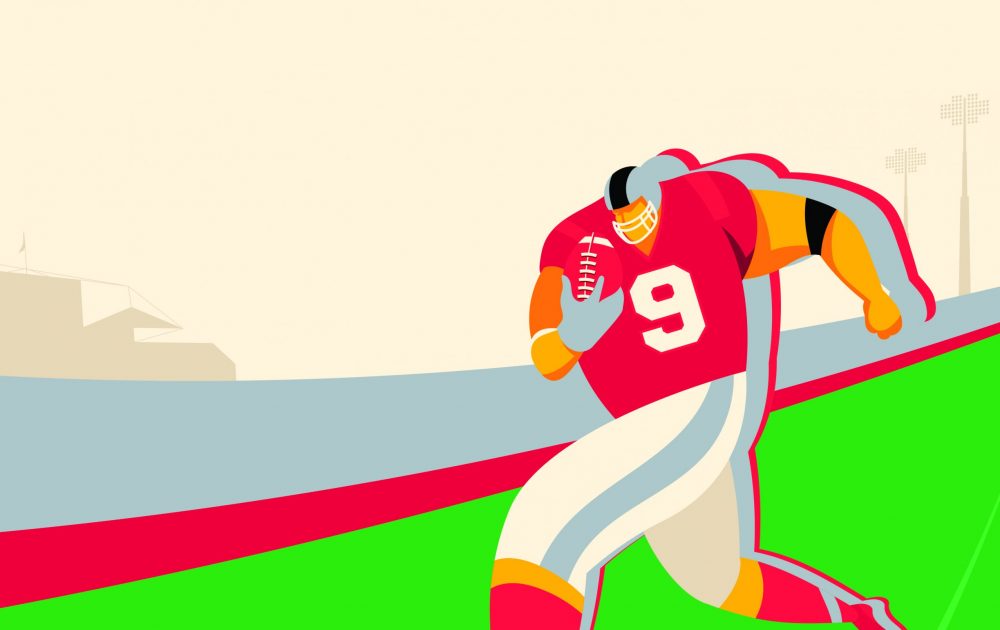
THE OFFICIAL SHOOK his head and tried not to listen to the vociferous voices and cacoph- ony of noise descending on him as he stood on the sidelines. The play before, he whistled the offensive team for a holding penalty, negating a long touchdown run.
While not keeping an accurate count, I noticed somewhere between 10 to 15 people rise from a sitting position in the stands and direct tirades in the officials’ direction. Many of the words ut- tered with boisterous explosion can’t be printed in this magazine.
I waited for a break in the action on the field and for the catcalls from the stands to die down before approaching the official. I tapped him on the shoulder and told him he made a great call.
The video footage I recorded showed three offensive linemen holding on the play. The official got it right. The call did affect the game, as the team whistled for holding lost by five points and was eliminated from the playoffs.
The official shook his head for a moment and sighed.
“Thanks. I’m still not sure why I continue to put myself through this.”
I’m not often at a loss for words, but at this moment I was. I recognized the official but didn’t know him well enough to know his name. I wanted to say something positive to reassure him, and as I tried to open my mouth two spectators came onto the field and began barking at him again.
All of this over a correct call in an eight-year- old football game.
I have no idea if that official still calls games, but statistics tell us the ranks of officials continue to shrink across the United States. The usual litany of long hours and low pay along with the need to
spend time with their family is offered up as an excuse for the lack of officials.
Training officials takes time and the national trend shows that fewer than 50 percent of new officials make it through their three years of calling games. But what’s not to like?
Lots of travel, working games three to five nights a week, dealing with angry coaches, fans and players – the list of job perks goes on and on. But even with all of that, officials can still be comforted by the fact that everybody hates them. Some local officials, who have been calling games for as many as three decades, say the vitriol they encounter on the sideline rates as some of
the worst they’ve ever encountered.
Just imagine what a late-round high school playoff atmosphere must resemble if parents of eight-year-olds lost it over the correct call in a youth game.
I witnessed the police have to escort a group of officials out of the field house following a close- ly contested state semifinal football game. The police were called, because more than 200 fans had surrounded the field house wanting a word with the officials.
Trust me. I know how tough it is when a close call doesn’t go your way, whether you’re a player, a fan or a coach. I would love to say I’ve always taken the high road, but I haven’t. And one particular sideline outburst I made still haunts me.
Since that day, I’ve tried to change my ways.
Sometimes it works, sometimes it doesn’t.
The problem we face is simple. If we con- tinue to scream and yell and treat officials like second-class citizens or worse, our children could find themselves not being able to play the sports they love.
The older officials tell me about the dearth of younger, talented officials and issue an ominous warning. A lot of the pool of officials remains older and will be retiring within the next 10 years. An officials’ shortage already squeezing asso- ciations in several states will not only get worse
but also turn dire.
So, what can be done?
In the words of my great grandmother, one simple thing can help change the current dynamic. “Treat other people with the same respect
that you want to be treated with.”
I know some officials act jerky. I also know plenty of fans, coaches and players do as well. Par- ents, and I am a serious offender as well, need to be better about how and when they critique officials.
If attitudes and treatment of officials fails to improve, fewer and fewer people will choose to become officials. Maybe next time a close call doesn’t go your way, before you react think how you would like it if the roles were reversed.
And if you can’t get over how bad that one of- ficial is, then go through officials’ training yourself and help fix the issue.
If you do, I hope you’re not on the receiving end of a verbal tirade like the youth football official or stuck in a field house because an angry mob lets a high school football games’ outcome work them into a tirade.
The next time you get the urge to let loose on an official, pause a second and think. What example are you setting and are you helping fuel a problem that could decimate sports in the next decade?
You just may view that one call in a different light.



